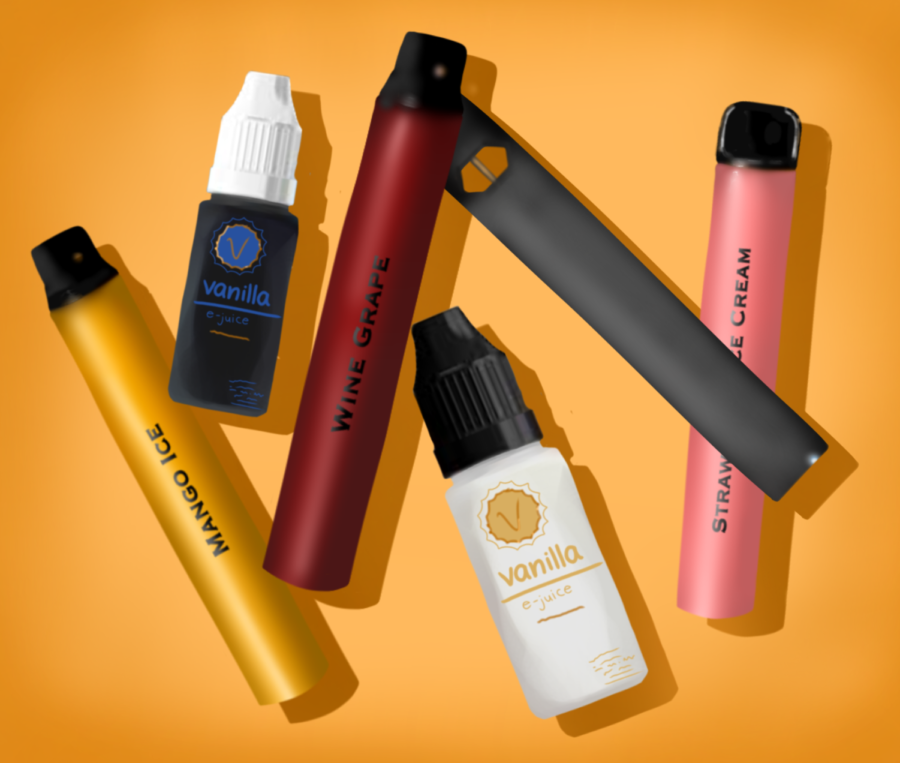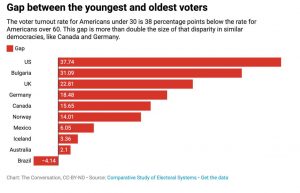Banning of flavored tobacco products in California with Proposition 31 is a step towards protecting youth
Prop 31’s ban on flavored tobacco products helps protect youth.
December 23, 2022
15,500. That is the number of estimated e-cigarette flavors that exist in the US. Any flavor you can think of is probably one of the countless options. The overwhelming variety of flavors, such as pink lemonade, Lava Flow and Berry Dweebz, are proof that these products are made specifically to hook youth. With the recent public vote in the gubernatorial elections to uphold Proposition 31, which places a ban on all flavored tobacco products, it is possible to turn the tide in the youth vaping epidemic, but not without continued advocacy for more measures to keep youth away from tobacco.
Proposition 31 was passed on Election Day with 68.4% of voters supporting the policy. Organizations such as Truth Initiative, Tobacco Free Kids and the American Cancer Society had been working to spread the message about the role of tobacco in different communities, especially the youth population, which contributed to the proposition’s passing.
Mary Kemp, Director of Grassroots Organizing for the American Cancer Society Cancer Action Network (ACS CAN), said, “ACS CAN has [been] part of the steering committee or the coalition of organizations that met regularly over the course of the past year to strategize and plan how we would activate and get voters out. We always knew we [had] the support of the majority of voters, but one of the struggles [was] getting people to turn out to vote. We had a physical presence at events and talk[ed] to people about the proposition, encourag[ing] [them] to pledge their support.”
In California alone, 96% of high school students who use e-cigarettes use flavored products, and 4 out 5 students who began using tobacco products started with a flavored product. Big Tobacco is using their many flavors to target youth and make them lifelong customers.
Although tobacco companies would not admit to be targeting youth with their products, their actions make it obvious that they do in fact want to lure youth into the addiction cycle. They have promoted their products through influencers, social media and even childrens’ cartoons, all of which are known to be popular advertising methods to reach youth.
For example, Juul, an e-cigarette company, bought ad space from Nickelodeon in 2020, contradicting their claims that they have never tried to market to the youth.
Furthermore, some tobacco companies have even openly declared how crucial of a market youth are for them. In a quote sheet by Tobacco Free Kids on how tobacco companies market to the youth, a quote pulled from an R.J. Reynolds Tobacco Company report stated, “Young Adult Smokers: Strategies and Opportunities – Younger adult smokers have been the critical factor in the growth and decline of every major brand and company over the last 50 years … Younger adult smokers are the only source of replacement smokers … If younger adults turn away from smoking, the industry must decline.”
Such statements make it clear why tobacco companies would be so opposed to a ban on the sale of flavored tobacco products – flavors are their only way to hook youth.
Derrick Kirk, co-coordinator of CourAGE Youth Health Coalition and a youth specialist in the Tobacco Youth Prevention Education (TUPE) program, explains, “Without flavors, young people don’t like the traditional taste of tobacco.”
In fact, tobacco companies did push back a lot when such a bill was first introduced. In August of 2020, Gavin Newsom passed Senate Bill 793, a bill banning the sale of flavored tobacco products.
Kemp said, “Senate Bill 793 had broad bipartisan support. It passed the state legislature, and Governor Newsom signed [it]. Unfortunately, the day after he signed the bill, the tobacco companies filed for the referendum, which is why it ended up on the ballot.”
Following the signing of the bill, R.J. Reynolds Tobacco Company launched a campaign to repeal the bill, in which they gained immense support, raising $3.2 million. Major donors also contributed to the campaign, such as the R.J. Reynolds Tobacco Company themselves, who contributed $13 million. The campaign also managed to gather over 100,000 signatures on their petition in just 30 days.
Despite the efforts of tobacco companies, Proposition 31 was still ultimately upheld by voters in the gubernatorial elections.
“It was very exciting to see the voters turn out in large numbers and [show that] this is what we wanted all along. The people of California stood up to Big Tobacco and that was really exciting,” Kemp says.
However, this is not a complete solution to the issue of youth getting addicted to flavored tobacco products.
“There are three exemptions [in Prop 31 for] loose leaf tobacco, small premium cigars, and, shisha or hookah,” Kemp explains.
Big tobacco companies are aware of these loophole and are working to exploit them in order to minimize the effects of the new Proposition on their profits.
“There has been a rise in the number of young people that are using flavored shisha. There [has] also been an increase in the number of businesses around campus areas that [are selling it],” Kemp corroborates.
To prevent this from becoming another major issue, further measures need to be taken. The best way to do this is for supporters to push for stricter flavored tobacco sale regulations on a local level in their own cities and counties as this is often much more successful than pushing for state or federal level legislation.
Even before the passing of Proposition 31, Kemp says, “Many volunteers were working at the local level and encouraging their cities and counties to take a stand in advance of the Proposition because it was an opportunity to ensure that, regardless of how the vote went, their community would be protected. Before Proposition 31 passed, there were over 135 local jurisdictions that [had] already passed a flavor ordinance [that would ban the sale of flavored tobacco products].”
Now, it is an opportunity for everyone to encourage their local governments to ban the sale of flavored loose leaf tobacco, small premium cigars, and hookah in order to ensure that Big Tobacco will not be able to exploit these loopholes in the legislation.
Progress is already being made in some counties, as Kirk states, “Contra Costa County has been doing an awesome job. There are different cities throughout the county, who’ve gone on to put ordinances in place to limit the sell of [all] flavor[ed products] within 1000 feet of schools.”
While such measures definitely need to continue in the future, Proposition 31 is nevertheless a huge win for all tobacco use prevention advocates.
Kemp quantifies, “The projected benefits of Prop 31 are preventing 7,600 premature smoking-related deaths and a $500 million reduction in annual health care costs.”
Big Tobacco won’t stop trying to pull youth into the addiction cycle, but neither will the hundreds of thousands of volunteers who will continue to work relentlessly to prevent this from happening.






